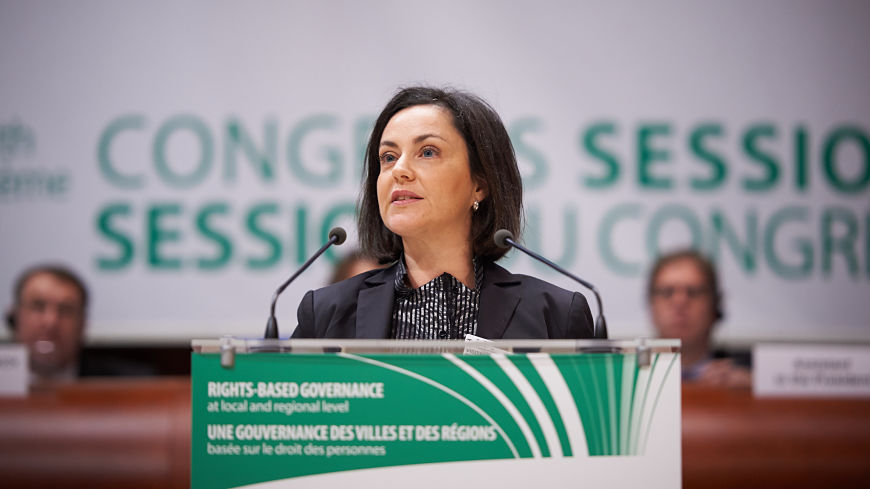The Congress and its institutional partners must work together to reaffirm loud and clear that only dialogue and negotiation, in line with the law and constitutions, can resolve crises between nation states and regions. During a debate on “regional identity and integrity of the nation state” held on 28 March 2018 in the Chamber of Regions, speakers and Congress members reiterated that regional autonomy, far from being a threat to states, can in fact strengthen the bonds between states and their regions.
Speaking in his capacity as General Rapporteur on local and regional authorities of the Parliamentary Assembly of the Council of Europe, Luís LEITE RAMOS (Portugal, SOC), highlighted the importance of regional identities in the development of many countries, while also emphasising that regional autonomy consists of exercising rights in line with national sovereignty. “Since 2003, the Parliamentary Assembly has affirmed that autonomy is not a step towards secession. Today, we must find the means to ensure that this remains true,” he said, reiterating once again that Europe, with its rich tradition of political dialogue, has a duty to set an example to the world in this field.
The Parliamentary Assembly will examine the matter of decentralisation again in October 2018, and Mr LEITE RAMOS called on the Congress to help it to “ease the tensions between states and regions” and to identify non-violent solutions. In his view, this would mean implementing consultation procedures, through a culture of dialogue and a shared desire to make progress, to which the Assembly intends to contribute actively, while building on the Congress’s experience in these matters.
Ana Luísa PEREIRA LUÍS, President of the Conference of European Regional Legislative Assemblies and President of the Parliament of the Azores (Portugal), listed some successful examples of regional autonomy within states, including, first and foremost, her own region. In her opinion, the regional autonomy of the Azores, granted in 1976, has strengthened its connection with mainland Portugal. She reiterated that, far from being the sign of a weak state, decentralisation in fact reinforces regions’ confidence in the nation. Conversely, however, regional autonomy cannot be built against states. She added that Europe’s strength lies in the fact that it protects the identities both of regions and of nations.
“In separatist crises, neither states nor regions are blameless”
Opening the debate, Karl-Heinz LAMBERTZ (Belgium, SOC), current President of the European Committee of the Regions (EU), said that the vast majority of the some 450 regions in Europe fit in well in the existing states, and that secessionist crises are always an indicator of serious problems. In such situations, “neither states nor regions” are blameless. A shared desire to make progress is the only means of responding to these crises, which otherwise would could worsen to the point of conflict. Several members then highlighted the existence of areas of regional tension in Europe, in particular in the regions “illegally separated from Ukraine,” as Yuliya SVITLYCHNA (Ukraine, IDLG) underlined, or as Christina McKELVIE (United Kingdom, NR) noted, following Great Britain’s desire to “drag Scotland out of the European Union against its will.”
Frank ZIMMERMANN (Germany, SOC) was concerned about the political crisis in Catalonia, calling for “compromise and dialogue, as the only way of finding a lasting solution.” Carlos MARTINEZ (Spain), Vice-President of the Council of European Municipalities and Regions (CEMR), reiterated that the law “safeguards democracy in Spain,” with his compatriot, Josefa NAVARRETE (Spain, SOC) adding that “the Catalan referendum was illegal and violated the constitution.”
Dialogue, the best solution to separatism
Despite dark clouds looming over these regions, pluralism and regional identities are, fortunately, respected in the majority of European countries, as demonstrated in the examples of Friesland in the Netherlands, Vojvodina in Serbia and Bashkortostan in the Russian Federation presented by members from these regions. When they took the floor, the youth delegates attending the debate nevertheless reiterated that the subject of regions within Europe must be better taught to young people, with the young Ukrainian delegate adding that it is better “to avoid conflict than to deal with it.”
Responding to the members’ various contributions, Luís LEITE RAMOS and Ana Luísa PEREIRA LUÍS confirmed that “regional identity is a strength for Europe and a strength for the future,” repeating once again their call for political dialogue to overcome separatism.
- Speech by Luís LEITE RAMOS, General Rapporteur on local and regional authorities of the Parliamentary Assembly of the Council of Europe
- Speech by Ana Luísa PEREIRA LUÍS, President of the Conference of European Regional Legislative Assemblies and President of the Parliament of the Azores (Portugal)
- Video of the debate
MEDIABOX INTERVIEW




